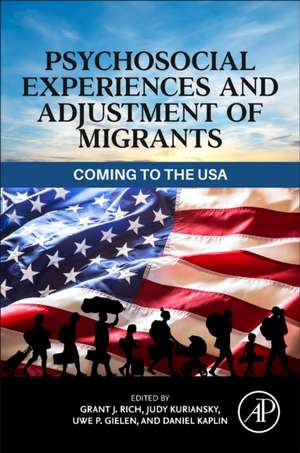Psychosocial Experiences and Adjustment of Migrants: Coming to the USA
Editat de Grant J. Rich, Judy Kuriansky, Uwe P. Gielen, Daniel Kaplinen Limba Engleză Paperback – 27 iul 2023
- Spotlights mental health and psychosocial experiences of migrants, as well as refugees and asylum seekers
- Provides greater depth about migratory patterns to the United States and the various complexities
- Examines psychological adjustments in the presence of trenchant sociocultural change, cultural conflict and family dislocation
- Discusses individual experiences and clinical case examples of migration to the USA through orderly and forced migration
- Profiles experiences of immigrants from various countries and regions such as Mexico, the Caribbean, Latin America, Europe, etc.
- Presents migration in the context of diverse stakeholders, including government, international agencies, civil society and even students
Preț: 681.16 lei
Preț vechi: 884.44 lei
-23% Nou
Puncte Express: 1022
Preț estimativ în valută:
130.36€ • 134.67$ • 108.49£
130.36€ • 134.67$ • 108.49£
Carte tipărită la comandă
Livrare economică 18 martie-01 aprilie
Livrare express 18-22 februarie pentru 95.84 lei
Preluare comenzi: 021 569.72.76
Specificații
ISBN-13: 9780128237946
ISBN-10: 0128237945
Pagini: 498
Dimensiuni: 191 x 235 x 29 mm
Greutate: 1.04 kg
Editura: ELSEVIER SCIENCE
ISBN-10: 0128237945
Pagini: 498
Dimensiuni: 191 x 235 x 29 mm
Greutate: 1.04 kg
Editura: ELSEVIER SCIENCE
Cuprins
Part I: Issues and Themes
1. Understanding the Legal and Historical Context of Migration to the United States
2. Pros and Cons of Coming to the USA: Perspectives from Those Who Live Here and Those Who Seek to Do So
3. Psychological Issues in Migration
4. Cultural Issues in Migration
5. Migration Struggles: Clinical Understanding Across Life Cycles
6. Securitization of Migration and Hate Crimes Towards Immigrants and Refugees
7. Gender and Migration: Women and Non-Binary Individuals at Risk
8. Psychological Issues and Support Systems for Children and Youth Refugees and Immigrants
9. The Culturagram Matrix: Domains of Migration Identities
10. Is Immigration Good or Bad for the United States? A Professional’s Personal Reflection on the Concepts of Coloniality and Mutual Benefit in Migration
Part II: Migration to the USA
11. Two Roads Diverged: Inequities Associated with Variations in the Migration Path from Mexico to the United States
12. Central American Diasporas: Psychological Considerations for Immigrants and Refugees from the Northern Triangle
13. Caribbean Immigrants in the United States and Canada: A Diverse Mosaic
14. Coming to America, the European Experience
15. African Immigrants in America: Finding Home Through Stories of Resilience
16. Coming to America from South Asia
17. Chinese, Korean, and Japanese Immigration to the US: Migration Patterns and Psychological Adjustment
18. Coming from Southeast Asia: Psychosocial Experiences and Adjustment of Southeast Asian Immigrants and Refugees
19. Forced Displacement from the Northern Triangle Region: Implications for Clinical Intervention and Training
20. You in Americuh, Now": African Forced Migrants in the 21st Century US
21. Understanding and Working with Middle Eastern and Syrian Migrants and Refugees
22. Refugees from Afghanistan
23. Afghan Girl Refugees Coming to America
24. The Role of Social Capital Provided by the Established Ethnic Enclaves in Ukrainian Refugees’ Resettlement in the United States
Part III: Stakeholders Roles, Advocacy and International Agreements
25. Diplomatic Psychology at the United Nations: The Global Compact for Safe, Orderly and Regular Migration
26. UNHCR and the Global Compact on Refugees: The Negotiation and Current Issues
27. Doing what Matters: The NGO Committee on Migration
28. Psychosocial Support for Migrants and Refugees: Similarities and Differences in Historic International Compacts
29. How Can Governments at the United Nations Work with NGOs on Immigration?
30. Experience and Perspective of a UN Ambassador Emeritus
31. Migrating to the United States: Aspirations and Challenges of International Students of Psychology
1. Understanding the Legal and Historical Context of Migration to the United States
2. Pros and Cons of Coming to the USA: Perspectives from Those Who Live Here and Those Who Seek to Do So
3. Psychological Issues in Migration
4. Cultural Issues in Migration
5. Migration Struggles: Clinical Understanding Across Life Cycles
6. Securitization of Migration and Hate Crimes Towards Immigrants and Refugees
7. Gender and Migration: Women and Non-Binary Individuals at Risk
8. Psychological Issues and Support Systems for Children and Youth Refugees and Immigrants
9. The Culturagram Matrix: Domains of Migration Identities
10. Is Immigration Good or Bad for the United States? A Professional’s Personal Reflection on the Concepts of Coloniality and Mutual Benefit in Migration
Part II: Migration to the USA
11. Two Roads Diverged: Inequities Associated with Variations in the Migration Path from Mexico to the United States
12. Central American Diasporas: Psychological Considerations for Immigrants and Refugees from the Northern Triangle
13. Caribbean Immigrants in the United States and Canada: A Diverse Mosaic
14. Coming to America, the European Experience
15. African Immigrants in America: Finding Home Through Stories of Resilience
16. Coming to America from South Asia
17. Chinese, Korean, and Japanese Immigration to the US: Migration Patterns and Psychological Adjustment
18. Coming from Southeast Asia: Psychosocial Experiences and Adjustment of Southeast Asian Immigrants and Refugees
19. Forced Displacement from the Northern Triangle Region: Implications for Clinical Intervention and Training
20. You in Americuh, Now": African Forced Migrants in the 21st Century US
21. Understanding and Working with Middle Eastern and Syrian Migrants and Refugees
22. Refugees from Afghanistan
23. Afghan Girl Refugees Coming to America
24. The Role of Social Capital Provided by the Established Ethnic Enclaves in Ukrainian Refugees’ Resettlement in the United States
Part III: Stakeholders Roles, Advocacy and International Agreements
25. Diplomatic Psychology at the United Nations: The Global Compact for Safe, Orderly and Regular Migration
26. UNHCR and the Global Compact on Refugees: The Negotiation and Current Issues
27. Doing what Matters: The NGO Committee on Migration
28. Psychosocial Support for Migrants and Refugees: Similarities and Differences in Historic International Compacts
29. How Can Governments at the United Nations Work with NGOs on Immigration?
30. Experience and Perspective of a UN Ambassador Emeritus
31. Migrating to the United States: Aspirations and Challenges of International Students of Psychology
